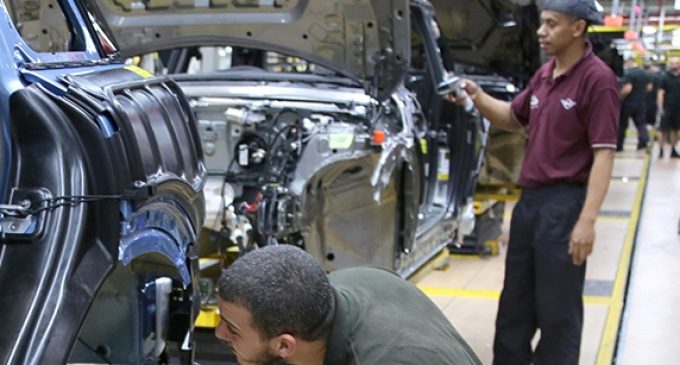UK automotive manufacturing carbon footprint falls to lowest ever level

The UK automotive industry’s production carbon footprint fell by -11.2% in 2021 compared with the previous year to reach its lowest level since records began, according to new research from the Society of Motor Manufacturers and Traders (SMMT).
SMMT’s latest annual Sustainability Report, now in its 23rd year, shows that automotive production and the supply chain emitted 81,095 fewer tonnes of CO2 in 2021 compared with the previous year. Average vehicle CO2 emissions meanwhile, were -11.2% less than their 2020 equivalents.1 Given the average car on UK’s roads is now nine years old, this carbon tonnage saving from production is the equivalent of taking 225,000 of these cars off the road and replacing them with the latest models. Since 1999, the industry has cut its CO2 emissions by 1.5 million tonnes or -70.6% – equivalent to taking almost 900,000 cars off the road.
Despite reduced production because of the global semiconductor shortage, the industry was still able to improve its environmental efficiency, with a -6.1% reduction in water used per vehicle produced, and a -2.6% reduction in waste going to landfill year-on-year. As a result of the industry’s commitments, -96.2% less waste per vehicle goes to landfill than did at the start of the millennium. In addition, since 2015 the industry has ensured that 95% of a vehicle by weight goes through a takeback network to be re-used, recycled or recovered.
 The UK’s world-renowned specialist and low volume manufacturers were even more successful in delivering sustainable production, emitting -26.6% less CO2 per vehicle produced and sending no waste to landfill at all. Water use per vehicle also fell by -11.6%, while overall production rocketed by 40.2% as the sector rebuilds post-pandemic. This achievement was matched by the supply chain, with the report’s signatories also sending zero waste to landfill and recording a -25.3% reduction in CO2 emissions per tonne of product shipped.
The UK’s world-renowned specialist and low volume manufacturers were even more successful in delivering sustainable production, emitting -26.6% less CO2 per vehicle produced and sending no waste to landfill at all. Water use per vehicle also fell by -11.6%, while overall production rocketed by 40.2% as the sector rebuilds post-pandemic. This achievement was matched by the supply chain, with the report’s signatories also sending zero waste to landfill and recording a -25.3% reduction in CO2 emissions per tonne of product shipped.
The report also shows the industry continuing to invest in its people: apprenticeship positions increased by 67%, in part due to the cessation of pandemic restrictions, but were also a full 16% higher than pre-pandemic levels as the sector sought to secure top talent for the future. Moreover, signatories remain committed to employee development, despite the overall economic challenges faced by businesses. In 2021 the number of training days per employee increased by 5.6% year on year, to 1.7 days per employee.
In addition the sector’s economic contribution is revealed, with UK automotive-related manufacturing turnover estimated to have recovered by 5% in 2021 to £67.1 billion, while automotive-related GVA is estimated at £14.1 billion, with 182,000 people directly employed in manufacturing roles.
Mike Hawes, SMMT Chief Executive, said: “With the automotive sector still trying to recover from the pandemic while simultaneously transitioning to zero emission vehicles, the improvements made in the sustainability of production this past year is a remarkable achievement. The report shows the industry delivering on its commitments, with dramatic reductions in both the energy used to make vehicles, and the emissions they release when on the road. The automotive sector is central to the UK’s carbon reduction ambitions and, with government support to improve UK competitiveness, we can ensure that transition continues to create well-paid, clean-tech jobs while generating economic prosperity and growth in all regions of the UK.”2
1: SMMT calculations based on the average CO2 emission of the average age car (8.7 years as of end of 2021) vs. average emissions of a car in 2021
2: Full Throttle to Full Charge – https://www.smmt.co.uk/reports/full-charge/




























